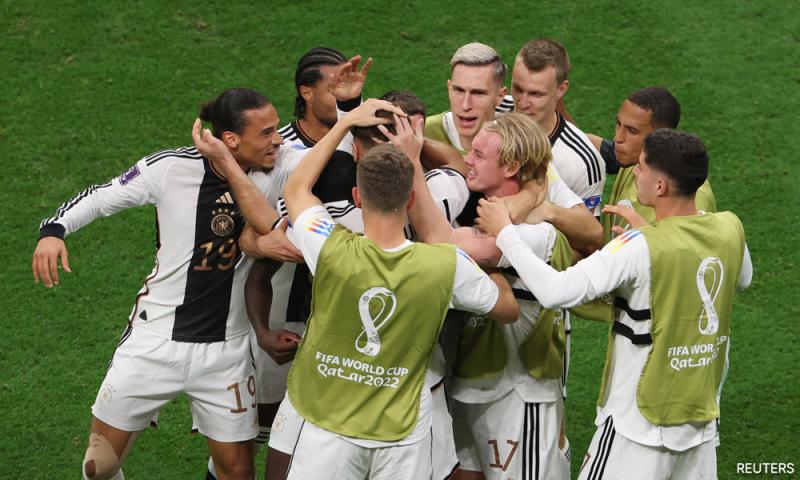Germans go back to basics to get back on track
Any job is easier when you use the right tools, and on Sunday a bruised Germany bounced off the World Cup ropes to come from behind in their Group E match with Spain to earn a priceless 1-1 draw and boost their chances of reaching the knockout phase.
An opening match defeat by Japan had hardly augured well for this clash in the Al Bayt Stadium.
Spain's 6-0 rout of the Germans the last time they met added to the apprehension. And the grim backdrop of dissatisfied sponsors, and many Germans back home wishing their team had not even come to Qatar because of the host nation’s human rights record, can have done little to boost German morale.
But if this was a German team in crisis, you would never have known and they set about their task with plenty of huff and not inconsiderable puff. Much industry, though precious little art.
Having survived until half-time goalless, the inevitable began to loom when they fell behind to a 62nd-minute Alvaro Morata flick.
A masterstroke
Many in the arena expected Spain to ease to the finish line as they stretched the Germans this way and that with incisive passing and tireless pressing.
But then German coach Hansi Flick played his masterstroke.
Sweeping aside years of alternative and introspective German attacking strategies centred on an obsession with "false nines", he threw on a real number nine, a target man in the most German of attacking moulds.
Never mind that the 29-year-old Niclas Fuellkrug had only made his Germany debut earlier this month in a friendly against Oman. With seven minutes left on the clock he smashed home a loose ball to revitalise the Germans and give them a point they thoroughly deserved.
Old-fashioned centre forward
Who knew? If you want goals, turn to an old-fashioned centre forward. It had worked in all four of Germany's World Cup titles.
"He showed his determination to score. He gives the team a lot...not only the goal. He has his heart in the right place," Flick told reporters.
Thoroughly reinvigorated from the introduction of Fuellkrug, Germany looked at a different side.
Eight years of tinkering following the retirement of all-time World Cup scorer Miroslav Klose was instantly forgotten as Fuellkrug led the line in the fashion of German World Cup greats Ottmar Walter, Gerd Mueller, Juergen Klinsmann and Klose.
Asking a 33-year-old Thomas Mueller to be the counter-attacking option had been a stretch, which ultimately allowed Spain considerable comfort and time in defence. But with the burly Fuellkrug rampaging around the Spaniards' back line, it was another matter altogether.
A grip on the game
From the 70th minute when he was thrown into the battle, Germany simply looked more German. They took more of a grip on the game. Became the bosses rather than the bullied. The last 20 minutes was a German performance as traditional as bratwurst and beer.
Suddenly sharper and stronger, the Germans swarmed forward and it would not have been a shock, nor a travesty, if they had converted a last-gasp golden chance to take the win.
Inside a 60,000-seater stadium built to resemble a Bedouin tent, this was hardly the greatest show on earth, but it did see Germany survive a toe-to-toe battle with one of the tournament favourites, and provide a major boost to their chances.
Certainly, the players who posed for the German team photo before their opening match with their hands held over their mouths to indicate their views on Gay rights being silenced, now have something to shout about in footballing terms here.
- Reuters
RM12.50 / month
- Unlimited access to award-winning journalism
- Comment and share your opinions on all our articles
- Gift interesting stories to your friends
- Tax deductable

 Reuters
Reuters